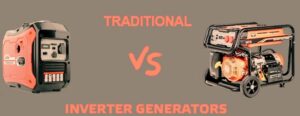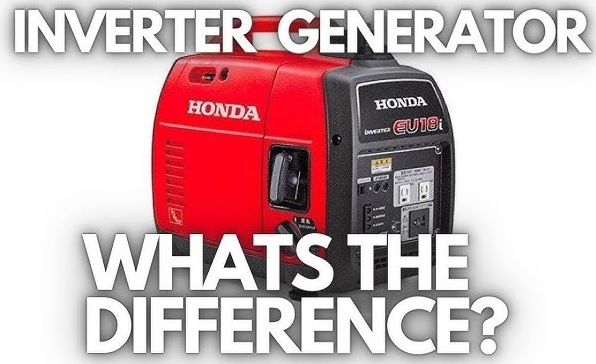The use of a generator is based on the electrical power needed and the devices to be used with the power demand. The inverter generator is a new technology for inverters that has features to run longer without noise and also provides high fuel efficiency. Inverter generators have many more good features than conventional generators, which will be covered here. Let’s get started.
What Is an Inverter Generator?
- The inverter generator converts DC power into AC power and AC power into DC power.
- In an off-grid system, the inverter generator gets DC power from the battery, and the solar power inverter generates DC power from solar.
- Devices used at home use AC power generated from an inverter.
- Inverter generator works in 3 phases: battery, DC to AC or AC to DC, and output.
- The inverter generator operates with a rectifier that transforms the AC power of the generator into DC current, and with an inverter, this power is converted into AC power.
- This method provides clean and stable electrical output and is good for the use of electronic devices like laptops, smartphones, and cameras.
features
- The inverter generator generated constant and high-quality electrical output having low harmonic distortion. So it is safe mode for giving power to laptops, phones, and TVs that are sensitive devices.
- Inverter generators also provide clean power without affecting the components of devices.
Efficiency
- This generator has high fuel efficiency and has a feature to set the engine speed according to power requirements. For a light load, the generator’s working speed is lower and uses low fuel. It reduces fuel expenses and provides good generator runtime, and we can get power with short fuel for a longer time.
noiseless operation
- inverter generator without generating sound. So it is better than conventional generators and provides peaceful operation. so we can use an inverter generator in outdoor events, camping, etc.
Lightweight
- It has a lower wait and more compact design than a traditional generator. so we can easily transport and store it. It is good to use for campers and RVs.
Parallel features
- • The inverter generator has parallel connection features with two generators that help to make the connection of the power output of two devices and provide double power.
- It is best to use for high-power applications and run different devices at the same time. The main features of inverter generators are clean and stable power output with portability.
- So they are used in different applications, like sensitive electronics, to applications where reliable backup power is needed.
What Is A Traditional Generator?
- A traditional generator is a device that is used for the conversion of mechanical energy into electrical energy. Generators give alternator power supplies a time of power shortage.
- Backup generators are good to use in homes, businesses, and hospitals.
- Different types of generators exist that work according to fuel type. like gasoline, diesel, dual fuel, etc.
- There are different uses of conventional generators, like providing good power backup for power shortages, and they also provide power to remote areas and construction sites.
Fuel Types of Traditional Generators
Gasoline
- Gasoline-powered generators are commonly used and provide easy refueling. It is easy to afford, and gasoline is stable for longer uses; accurate fuel handling is needed.
Propane
- Propane-based generators provide clean-burning features and a longer working life. Propane is stored in tank, and easy to available when needed. The propane generator comes with lower output power than the gasoline type
Dual-Fuel
- A dual-fuel generator has flexibility in operation since it can work through gasoline or propane and helps to switch between fuel sources according to requirements. This generator provides a longer working life and is a good backup power option to use.
Differences Between Inverter Generators and Traditional Generators

Size
- • The inverter generator is compact and low weight as compared to a conventional generator. The portable design helps with easy storage and transportation, and traditional generators are heavy and difficult to transport.
Noise Level
- inverter generator is made to operate noiselessly, and its noise range is 50-60 decibels.
- conventional generators sound in the range of 70-90 decibels, according to the model
Portability
- • The inverter generator is lightweight since it has a compact size and handles. It is best used for outdoor activities and recreational uses.
- Conventional generators are static and need more devices, like wheel kits, to enhance mobility.
Clean and Stable Power
- Inverter generator provides stable and clean power having low total harmonic distortion. It uses components for the regulation of voltage and frequency of output and provides a constant power supply. so best to use for sensitive electronic devices.
- Traditional generators are reliable and generate high THD power that can affect sensitive devices.
Fuel Efficiency
- Inverter generators provide high fuel efficiency, and so they set engine speed according to power demand and run at low speed for light loads. This low-fuel feature provides a longer working life and reduces fuel use.
- A conventional generator has features to provide power and uses more fuel for light loads.
Capacity
- The capacity of fuel of the generator is higher than the solar-based inverter generator. The regular generator produces power output in the range of 1000 watts to 10,000 watts.
- • A conventional hybrid solar inverter generator produces power output in the range of 1000 watts to 5000 watts. It generated lower power than a fuel generator with high efficiency.
- Fuel generators provide about 40 percent efficiency, which is not enough. Solar inverter generators are highly effective. They provide power output efficiency of about 95% to 97%. These hybrid inverters are highly effective inverter generators.
- The fuel generator does not generate stable power and produces unstable output power, resulting in voltage spikes.
Cost
- Fuel generators use gasoline or diesel for work. For their work, we need fuel. The starting cost is low, but fuel expenses are higher. that makes it low effective for efficiency and TOC,
- Inverter generators have a high starting cost but need a battery for DC power supply. The use of devices and batteries increases overall expenses.
- We do not need to consume time that reduces TOC, so we are a cost-effective solution.
- Fuel engines need to be replaced and fixed after a certain time, which makes it costly.
Maintenance
- For the accurate working of machines, there is a need for regular maintenance. If we do not do proper maintenance, it causes issues, like clogs, and worn-out spark plugs are the main errors.
- Battery inverter generators use low maintenance.
- We needed proper battery health monitoring and to check wiring and connections. Normally, a battery works for three to five years.
- Inverter generators are not complicated, since they need low maintenance.
Inverter Generators vs Traditional Generators
| features | Inverter Generator | Regular Generator |
| Noise | noiseless | Loud |
| Capacity | Lower | Higher |
| Power quality | clean and stable | less stable power |
| Suitability | used for electronics | Not good for TVs |
| Efficiency | efficient Generator, 95% to 97% | 40% |
| Maintenance | Lower maintenance | Higher maintenance |
| Emissions | Environment friendly | Higher emissions |
| Cost | Higher initial cost, but efficient | Lower initial cost, higher uses cost |
Which Is the Right Option for You?
Inverter generators and conventional generators are different based on features, technology, and use. Inverter generators provide clean power, high fuel efficiency, and noiseless operation and are best used for sensitive electronics like phones and TVs.
Conventional generators have high power capacity and are good to use for heavy-duty applications and provide backup power in residential uses.
The option for using an inverter and a conventional generator is based on cost, applications, noise tolerance, and probability.
Based on these factors, we can use an accurate generator for your applications.
FAQs
What Are the Advantages of an Inverter Over a Generator?
- Inverter generators provide more benefits than traditional generators that use fossil fuels such as gas or propane. The main feature of fuel efficiency is to handle light to medium loads.
- As compared to a conventional generator, the inverter throttles up or down according to consumption rather than running at high capacity, and saves cost.
- The inverter is noiseless and provides clean power and is free of gas generators.”
How long do inverter generators last?
- The working life of an inverter generator is 1000 to 2000 hours. For continuous running of the inverter generator, run for 8 to 12 hours. It is effective for use. For longer runs, a conventional generator with a larger fuel tank is used.
Is an inverter generator good for home use?
- For larger loads where backup power is needed for power outages, an inverter is not a good option. For certain device-based power, an inverter generator is effective to use.
Conclusion
for effective power requirements that are environment-friendly, generate low noise and low emissions, and are easy to transport. An inverter generator is best to use as compared to a regular generator. For providing power to complete buildings for a longer time and low starting costs for generator inverter generators, they are not suitable to use.
